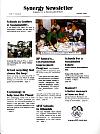

synergy vol 1 issue 2
The Next
Reformation
an interview
with Paul Hawken, by Sarah Van Gelder
Part
1
Sarah: Why is this such a well-kept secret? How is it that there isn't more understanding about the decline of industrialism?
Paul: Globally and nationally we are still looking at this set of problems as distinct and unconnected rather than seeing them as inextricably bound to the underlying assumptions that inform linear industrial systems. Basically, the underlying principles of industrialism don't work. In short, industrialism is over.
The massive inefficiencies of industrialism are not more apparent because they are masked by a financial system that gives improper information. This is a classic case of "garbage in, garbage out." In this case the "garbage in" is what money tells us, what prices tell us, what the markets tell us.
Instead of markets giving proper information, everything else is giving us proper information: our airsheds and watersheds, our soil and riparian systems, our bodies and health, our society, inner cities and rural counties, the breakdown of stability worldwide and the outbreak of conflicts based on environmental shortages. All these are providing the information that our prices should be giving us but don't.
Sarah: What do you say to people who are feeling discouraged, particularly by the strength of the backlash represented by the Republican Congress?
Paul: The shift we're seeing is incremental and slow, which is what you would expect if it's to be long-lasting. What is being focused on, quite rightly and understandably, is the strengthening of a laissez-faire corporate socialism in Congress, and second, widespread attacks on the environmental movement and ethos.
Those two trends would seem to suggest that the environmental movement has reached the high-water mark and is now ebbing, and that something else is replacing it. And I would say it's completely the other way. I think an old style of addressing environmental problems is ebbing, but the rise of the so-called conservative, political movement in this country is not a trend towards the future but a reaction to this very broad shift that we are undergoing. Newt and family are not pointing to an adventurous new civilization, as much as they would like to claim that ground. They are actually afraid of the future because their singular mindset cannot encompass its complexity, even its beauty.
Thus, the forces and value systems that are most threatened by this shift are becoming the most coherent and are rising to the top as minority or plurality powers. But they do not represent either the shift, the change, or the future. I think the media, Newt Gingrich, and others are mistaking reactive thinking for a long-term trend. I see it as a short-term oscillation, although we have to be careful here in recognizing that reactionary minorities can easily come to power and wreak terrible damage on societies, even the world as we experienced in the '30s and '40s.
If, as is natural, you focus on the corruption and on those threatened institutions that are trying to prevent change - even though they don't really know what they're trying to prevent - then you can get pessimistic.
But if you understand this collapse as both the precipitant and the symptom of a reformation, then you can read it in a different way. It's still just as greedy, corrupt, or - probably the nicest thing you can say - inappropriate to this time and age. But you can also see it in a larger context and understand a pattern that's occurring.
![]()
SFSF
Schools For a Sustainable Future

1 Curdies St.
E. Bentleigh Vic. 3165
Email:
Joe Natoli
Ph: (03) 9579-7224 Fax:
(03) 9579-6153 Mobile: 0411-568-523
Website
designed & maintained by
